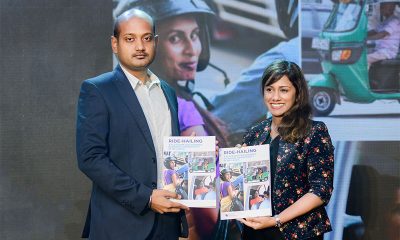Business
Uber partners with UNDP Sri Lanka to raise awareness against Sexual and Gender Based Violence
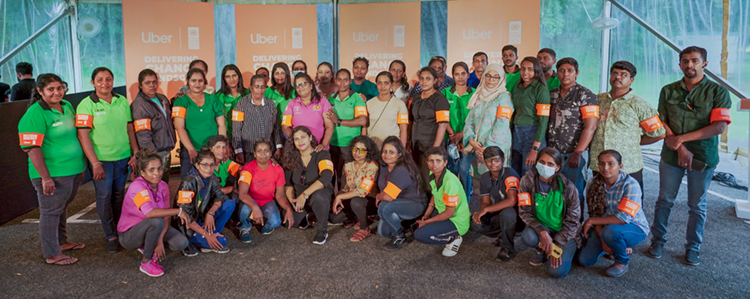
The 16 days of Activism against Sexual and Gender-Based Violence (SGBV) commemorated globally starting 25 November each year, is an invaluable tool to raise awareness on these important issues and to support complex public discussions about violence against women and girls.
The United Nations Development Programme (UNDP) in Sri Lanka as a part of its overall engagement with Uber Sri Lanka, has partnered with its Rides and Eats businesses in the lead up to the 16 Days of Activism this year, to launch ‘Delivering Change’. #End SGBV’, a campaign to build awareness through its network of couriers, drivers, merchant partners, and customer base across both Rides and Eats platforms in Colombo, to speak up and advocate for social issues through SGBV.
Commenting on the partnership, Varun Wijewardane, General Manager of Uber Eats Sri Lanka, noted, “At Uber, we are committed to supporting the communities we serve. This partnership with UNDP to spread awareness about available channels of support to combat sexual and gender based violence is a step in the right direction. We are proud to lend our platform to this important cause and hope it can contribute to delivering change.”
As part of this partnership, Gender experts from UNDP will undertake in-person sensitization sessions for select drivers and couriers from Uber and Uber Eats respectively, to raise awareness about SGBV and provide practical guidance on how to handle such sensitive situations during their rides or deliveries. In solidarity with the campaign, drivers, couriers, and merchant partners will wear orange armbands as a visible symbol of support signifying our collective commitment to fostering a safer environment for all, emphasizing the need for increased awareness and vigilance. Information kits with details on getting support for survivors of SGBV will be provided to high-volume merchant partners to be included in all take-away orders during the 16 days of activism. Across the 16 days of activism, eaters will receive in-app messaging with vital information on protections and support available for victims of SGBV.
Highlighting the importance of such partnerships, Azusa Kubota, Resident Representative, UNDP in Sri Lanka, noted, “Fighting gender-based violence requires a whole of the society efforts. Therefore, UNDP supports partners in their efforts including ensuring that women survivors have access to legal support, economic and social essential services and receive an enabling environment to rebuild their lives. Working together with partners such as Uber Sri Lanka, UNDP reiterates our commitment to standing with survivors, giving them a voice and facilitating their empowerment.”
Violence against women continues to be an obstacle to achieving equality, development, peace as well as to the fulfillment of women and girls’ human rights. The promise of the Sustainable Development Goals (SDGs) – to leave no one behind – cannot be fulfilled without putting an end to violence against women and girls. The ‘Delivering Change, #End SGBV’ advocacy campaign which commenced today, will run throughout the 16 Days of Activism period which ends on 10 December 2023, with UBER Eats couriers, merchant partners and customers carrying the important message to stand united against SGBV in Sri Lanka.
Business
Oil prices rise after ships attacked near Strait of Hormuz

Global oil prices have risen after at least three ships were attacked near the Strait of Hormuz, as Iran continues to launch strikes across the Middle East in response to ongoing attacks by the US and Israel.
Two vessels have been struck, and an “unknown projectile” was reported to have “exploded in very close proximity” to a third, the UK Maritime Trade Operations Centre (UKMTO) said.
Iran has warned ships not to pass through the strait, which carries about 20% of the world’s oil and gas.
International shipping has almost come to a standstill at the strait’s entrance, with analysts warning that a prolonged conflict could push energy prices even higher.
In early trade in Asia on Monday, global oil prices jumped by more than 10% before those gains eased during the morning.
At 02:00 GMT, Brent crude was more than 4% higher at $76.16 (£56.53) a barrel, while US-traded oil was also up by around 4% at $69.67.
“The market isn’t panicking”, Saul Kavonic, head of energy research at MST Research told the BBC.
“There is more clarity that so far, oil transport and production infrastructure hasn’t been a primary target by any side,” he added.
“The market will be watching for signs that traffic through the Strait of Hormuz returns, which would see oil prices subside again.”
But some analysts have warned it could go over $100 in the event of a prolonged conflict.
On Sunday, the Opec+ group of oil producing nations – which includes Saudi Arabia and Russia – agreed to increase their output by 206,000 barrels a day to help cushion any price rises, but some experts doubt this would help much.
Edmund King, president of the AA, warned the disruption could drive up petrol prices around the world.
“The turmoil and bombing across the Middle East will surely be a catalyst to disrupt oil distribution globally, which will inevitably lead to price hikes,” he said.
“The magnitude and duration of pump price increases depends on how long the conflict goes on.”
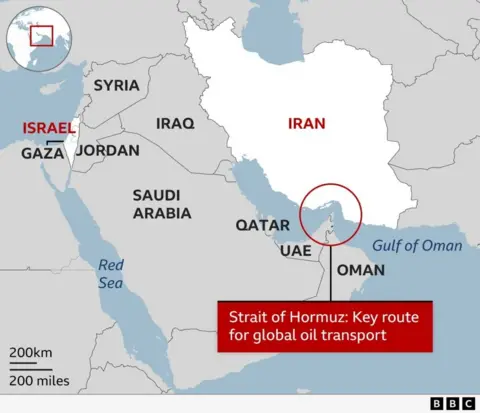
Business
Iran strikes could add external pressure on Sri Lanka’s fragile recovery: Analyst
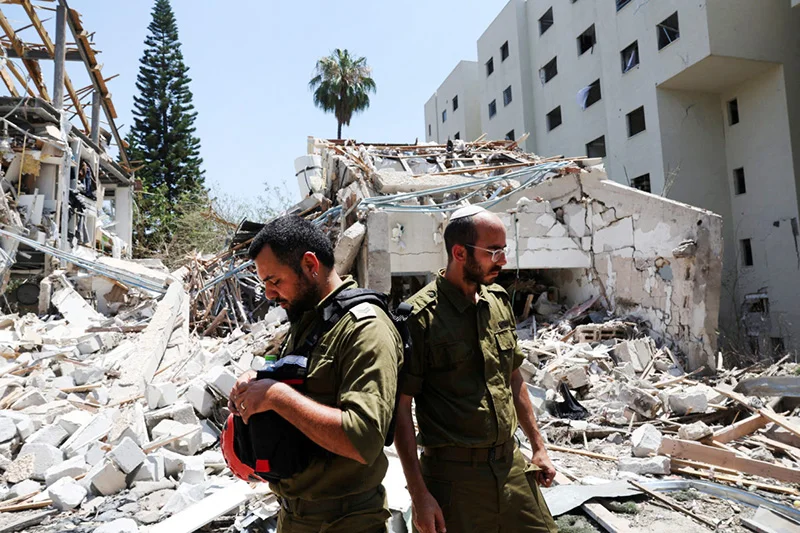
The U.S. and Israeli strikes on Iran have reignited geopolitical tensions in the Middle East, stoking fears of a broader conflict that could disrupt critical energy supply routes – particularly the Strait of Hormuz, through which roughly one-fifth of the world’s oil supply flows. Brent crude has already edged higher, and global oil markets warn prices could climb toward, or even exceed, US$80–100 a barrel if hostilities escalate.
Against this backdrop, an independent economic analyst told The Island that for Sri Lanka – a small, fuel-importing economy with limited domestic energy resources – the implications could be significant.
“Sri Lanka imports over 90% of its petroleum requirements, and any sustained rise in global crude prices would expand the annual import bill, placing renewed pressure on already tight foreign exchange reserves,” he said.
Even moderate spikes in oil prices, he noted, tend to filter quickly through the domestic economy. “Higher fuel costs translate into increased transport and production expenses, which feed into inflation and erode household purchasing power. Freight charges for essential goods – from food items to industrial inputs – would also rise.”
“The Middle East remains a key source of remittances and export demand,” the analyst explained. “A large share of Sri Lankan migrant workers are employed in Gulf economies, while regional markets absorb tea and other exports. Heightened instability could weaken remittance inflows and soften demand, further straining the balance of payments.”
When asked whether the Central Bank of Sri Lanka (CBSL) might be compelled to shift policy in response, the analyst said the monetary authority faces a delicate balancing act.
“Rising import inflation stemming from higher global energy prices could push the Central Bank to maintain – or even tighten – its monetary policy stance in order to safeguard price stability and support the rupee. A firmer stance may be deemed necessary to anchor inflation expectations and preserve market confidence. The Central Bank is therefore likely to monitor inflation data closely in the coming weeks to assess whether energy-driven price pressures prove temporary or more entrenched,” he said.
Meanwhile, Ceylon Petroleum Corporation (CPC) Chairman S. Rajakaruna said that Sri Lanka’s fuel imports – sourced primarily from Singapore and India – reduce immediate exposure to supply disruptions directly linked to Middle Eastern routes. He also sought to allay public concerns, noting that the country currently maintains sufficient fuel stocks for approximately one month and that there need not be any queueing up by the public to hoard supplies.
However, the analyst cautioned that while physical supply may remain stable, global price pass-through effects are an unavoidable risk.
Meanwhile, Opposition politician Wimal Weerawansa said that official assurances of “one month’s stock” tend to unsettle the public, arguing that such statements evoke memories of past shortages and public distress.
By Sanath Nanayakkare
Business
Ministry of Education recognises LOLC Divi Saviya for restoring 200 schools
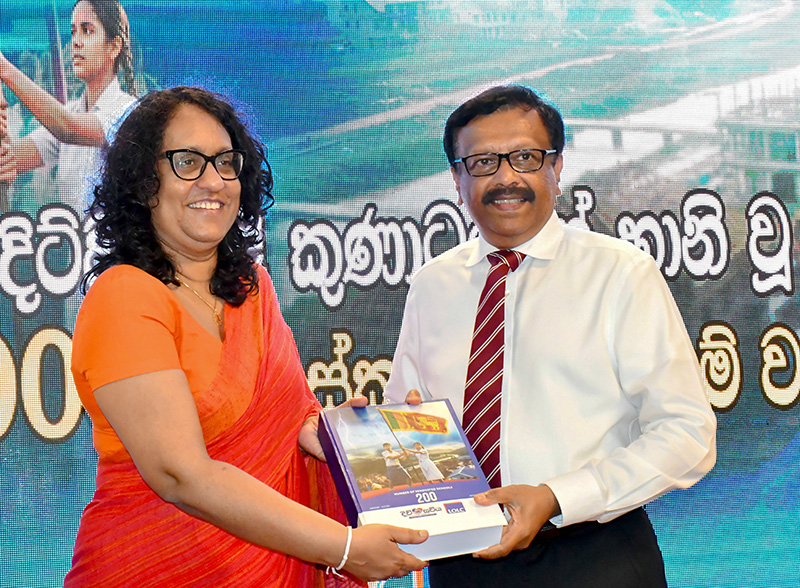
The Ministry of Education officially recognised LOLC Holdings PLC for its flagship humanitarian initiative, Divi Saviya, at a special ceremony held on 27th February 2026 in Battaramulla. The event marked the second time the Ministry has acknowledged the programme’s contribution to the nation’s education sector.
Group Managing Director/CEO Kapila Jayawardena presented a project update to Prime Minister and Education Minister Dr. Harini Amarasuriya, highlighting the rapid restoration of 200 schools under Phase 02 of ‘Obai, Mamai, Ape Ratai’. The schools were repaired and handed over within just 45 days, enabling students displaced by Cyclone Ditwah to safely resume learning.
Phase 02 follows a needs assessment that identified 200 damaged schools and 4,000 displaced families. Implemented with Divisional Secretariats and Disaster Management Centres, the Rs. 500 million programme has delivered Family Super Packs and school renovations across six districts.
Kapila Jayawardena stated, “It was a privilege to share these outcomes with the Prime Minister. This recognition reflects how private sector collaboration can complement government efforts during national challenges.” Plans are underway to fully rebuild select schools destroyed by the cyclone.
-

 Opinion4 days ago
Opinion4 days agoJamming and re-setting the world: What is the role of Donald Trump?
-

 Features4 days ago
Features4 days agoAn innocent bystander or a passive onlooker?
-

 Features6 days ago
Features6 days agoBuilding on Sand: The Indian market trap
-

 Features5 days ago
Features5 days agoRatmalana Airport: The Truth, The Whole Truth, And Nothing But The Truth
-

 Opinion6 days ago
Opinion6 days agoFuture must be won
-

 Business6 days ago
Business6 days agoDialog partners with Xiaomi to introduce Redmi Note 15 5G Series in Sri Lanka
-

 Business5 days ago
Business5 days agoIRCSL transforms Sri Lanka’s insurance industry with first-ever Centralized Insurance Data Repository
-

 Sports7 days ago
Sports7 days agoCEA halts development at Mandativu grounds until EIA completion








